Featured Courses
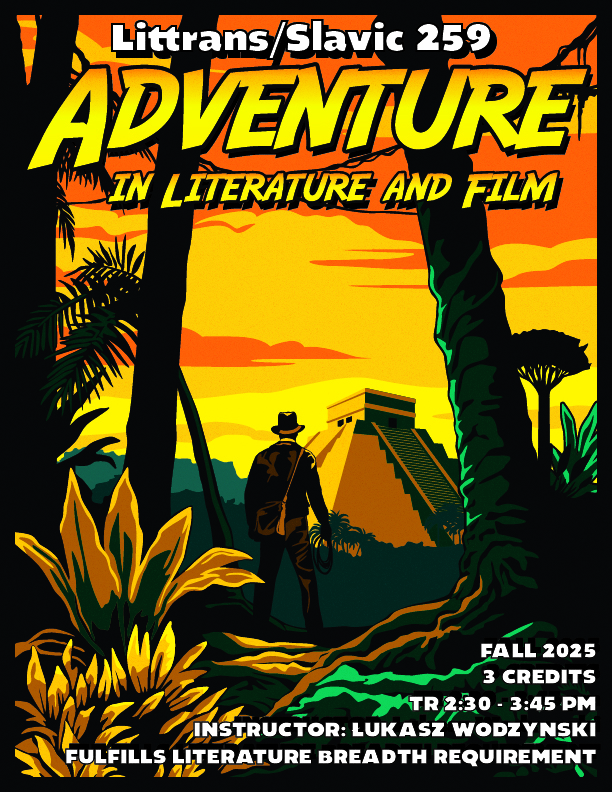
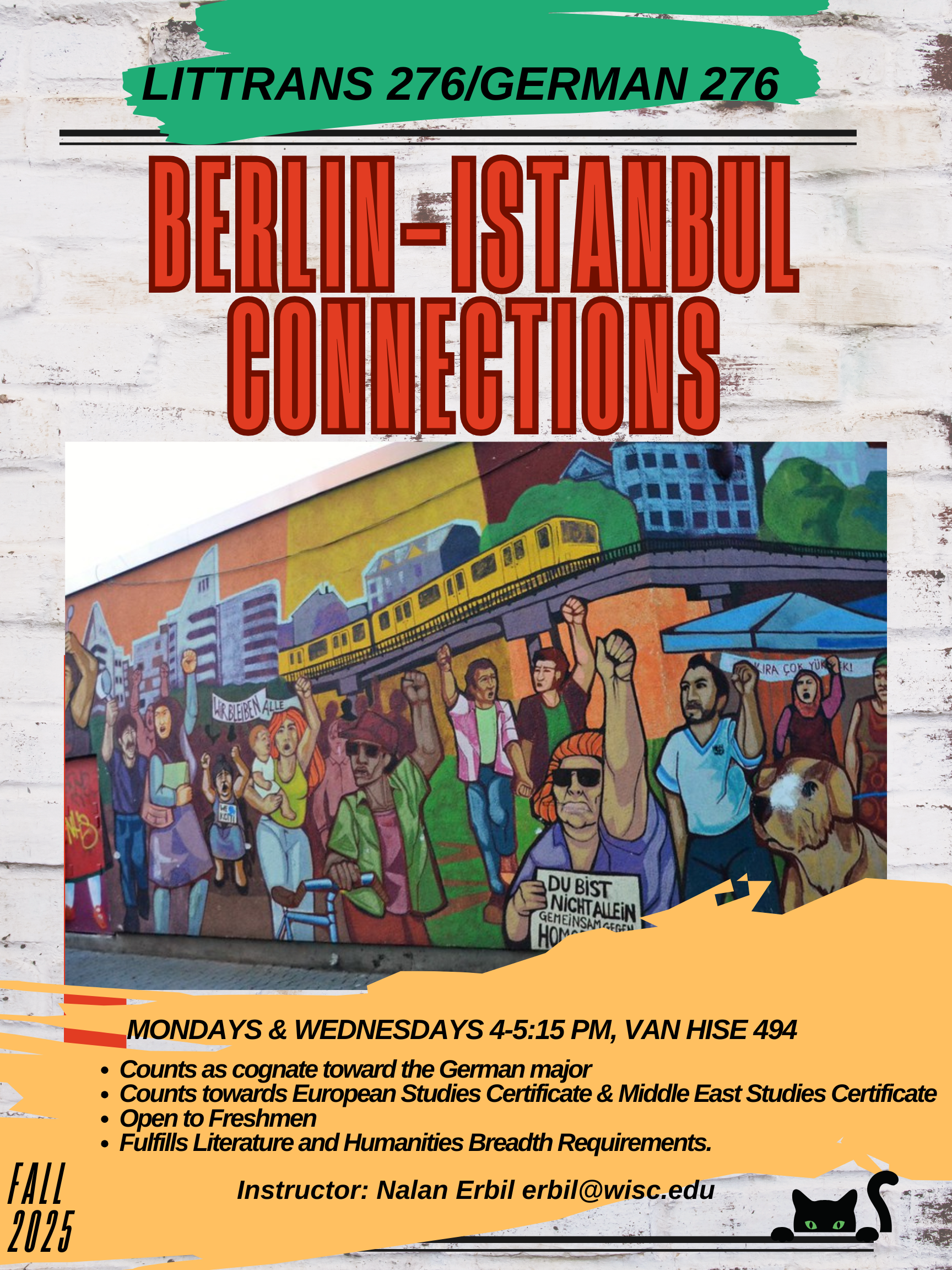
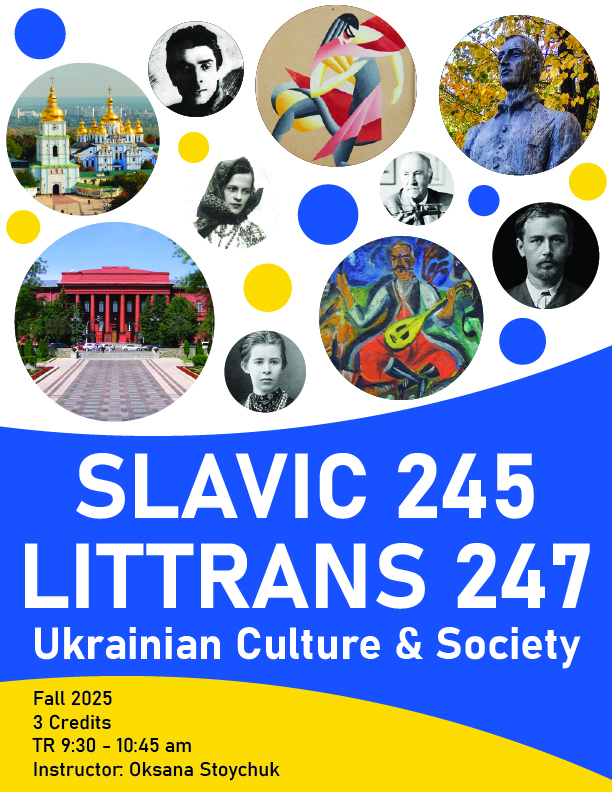
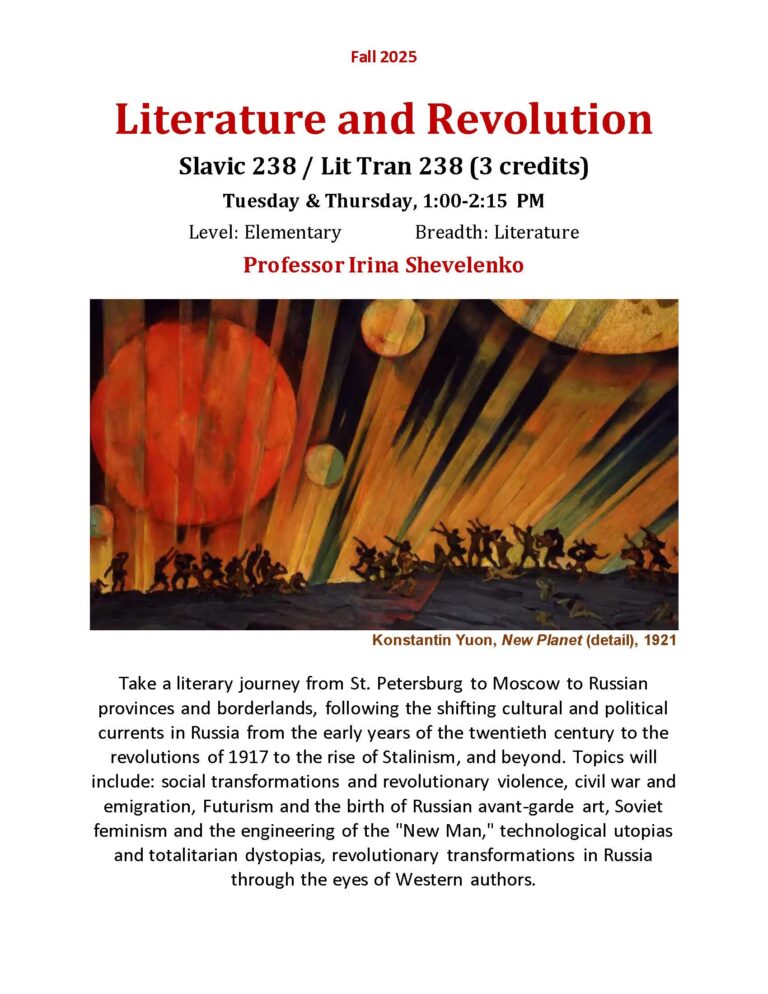
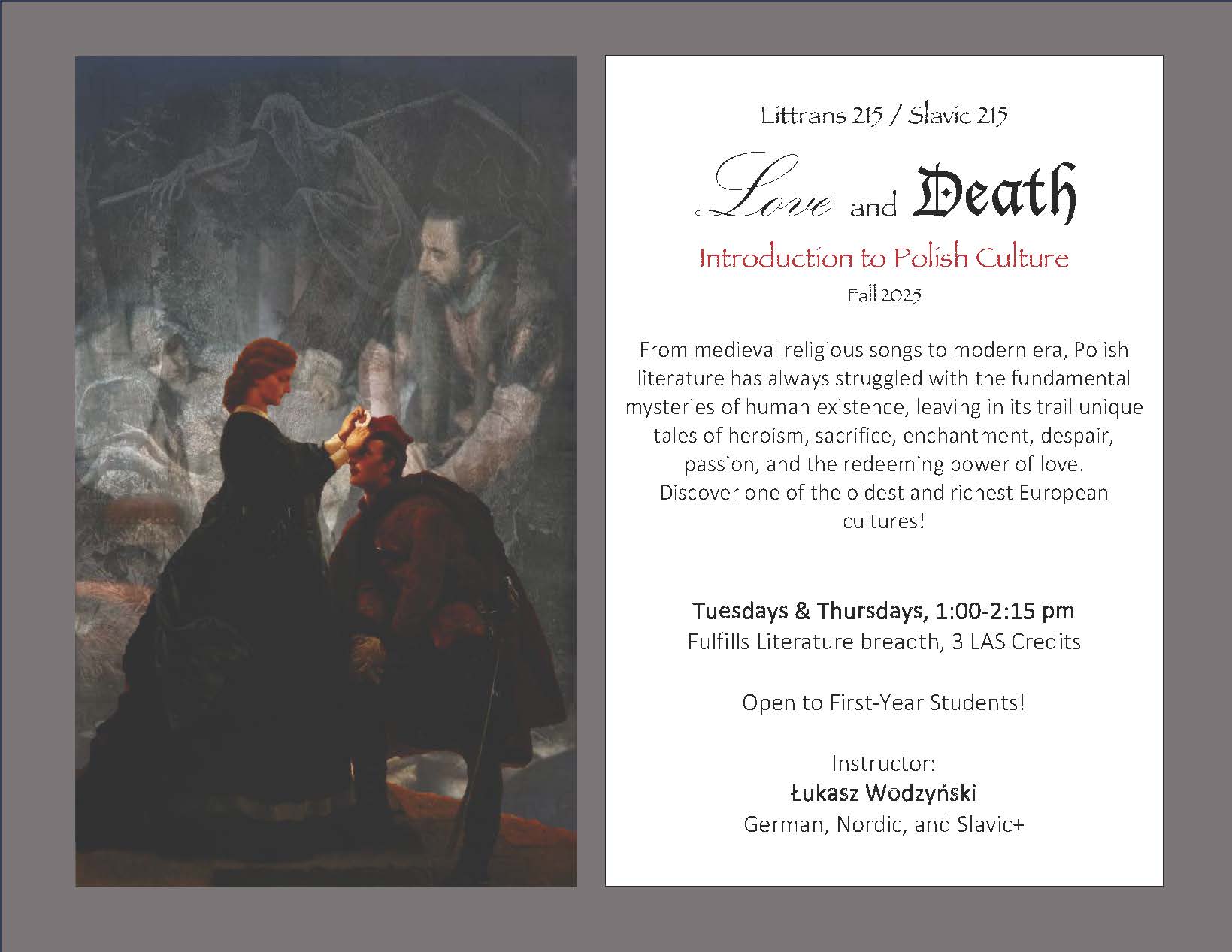
This is an accordion element with a series of buttons that open and close related content panels.
LITTRANS 201 - Survey of 19th and 20th Century Russian Literature in Translation I
(3 credits)
- MWF 11:00 – 11:50 am
Instructor: Kirill Ospovat
Course Description: Introduction to major and lesser known works of 19th century Russian fiction in translation, from Pushkin to Chekhov. The lectures are meant to guide students through difficult but richly rewarding texts while inspiring them to arrive at their own creative interpretations. Themes that we will touch on this semester will include: Russia’s imperial past (and present), class structures and divisions, urban legends and myths, female representation and authorship, religious faith and transgression, mortality and sexual desire. No prior knowledge of Russian literature is required. All readings will be in English.
LITTRANS 203 - Survey of 19th and 20th Century Russian Literature in Translation I
(4 credits)
- Lecture 001: MWF 11:00 – 11:50 am
- Discussion 301: T 9:55 – 10:45 am
- Discussion 302: T 11:00 – 11:50 am
- Discussion 303: T 12:05 – 12:55 pm
- Discussion 304: T 1:20 – 2:10 pm
Instructor: Kirill Ospovat
Course Description: Introduction to major and lesser known works of 19th century Russian fiction in translation, from Pushkin to Chekhov. The lectures are meant to guide students through difficult but richly rewarding texts while inspiring them to arrive at their own creative interpretations. Themes that we will touch on this semester will include: Russia’s imperial past (and present), class structures and divisions, urban legends and myths, female representation and authorship, religious faith and transgression, mortality and sexual desire. No prior knowledge of Russian literature is required. All readings will be in English.
LITTRANS 205 - Women in Russian Literature in Translation
(3-4 credits)
- MWF 9:55 – 1o:45 am
Instructor: Karen Evans-Romaine
Course Description: Description to come!
Meets with SLAVIC 405.
LITTRANS 215 - Love and Death: Introduction to Polish Literature & Culture
(3 credits)
- Lecture 001: TR 1:00 – 2:15 pm
Instructor: Lukasz Wodzyński
Course Description: Description to come!
Prerequisites: None
LITTRANS 222 - Dostoevsky in Translation
(3 credits)
- MWF 11:00 – 11:50 am
Instructor: Andrew Reynolds
Course Description: Description to come!
Prerequisites: None
LITTRANS 223 - Vladimir Nabokov: Russian and American Writings
(3 credits)
- MWF 11:00 – 11:50 am
Instructor: Sara Karpukhin
Course Description: In this course you will get to know the Russian-American novelist Vladimir Nabokov (1899-1977). It spans both the Russian- and English-language parts of his career. You will discover the “Nabokov effect,” the writer’s love of pattern, and the system of cognitive challenges and rewards in his fiction. You will read Nabokov’s major works from the perspective of history and politics, ethics and art: learn about the “nightmare of history” in 20th-century Europe as well as the writer’s struggle as a refugee from war, ideology, and racial hatred.
Prerequisites: Sophomore standing.
LITTRANS 229 - Representation of the Jew in Eastern European Cultures
(3 credits)
- MW 4:00 – 5:15 pm
Instructor: To come!
Course Description: Course description to come!
Honors optional.
LITTRANS 233 - Russian Life and Culture Through Literature and Art (to 1917)
(3-4 credits)
- Lecture 001: MWF 2:25 – 3:15 pm
- Lecture 002: MWF 2:25 – 3:15 pm
- Discussion 301: T 2:25 – 3:15 pm
Instructor: Jennifer Tishler
Course Description: Description to come!
Prerequisites: None
LITTRANS 238 - Literature and Revolution
(3 Credits)
- Lecture 001: TR 1:00 – 2:15 pm
Instructor: Irina Shevelenko
Course Description: Take a literary journey from St. Petersburg to Moscow to Russian provinces and borderlands, following the shifting cultural and political currents in Russia from the early years of the twentieth century to the revolutions of 1917 to the rise of Stalinism, and beyond. Topics will include: social transformations and revolutionary violence, civil war and emigration, Futurism and the birth of Russian avant-garde art, Soviet feminism and the engineering of the “New Man,” technological utopias and totalitarian dystopias, revolutionary transformations in Russia through the eyes of Western authors.
Prerequisites: None
Crosslisted with SLAVIC 238
Meets with Slavic 366 (graduate students only)
LITTRANS 247 - Ukrainian Culture and Society
(3 credits)
- Lecture 001: TR 9:30 – 10:45 am
Instructor: Oksana Stoychuk
Course Description: This course is designed to introduce students to the fascinating world of Ukrainian culture from pre-Christian times to the present day. We will examine a number of cultural facets that help create Ukraine: history, folklore, language, art, literature, music, as well as current situation in Ukraine. We will learn how to tell fortunes with hot wax and what visual poetry means; we will learn the most popular Ukrainian (and American) Christmas carol and we will explore linguistic and historical nuances, which will help us embrace Ukrainian culture and history. All required texts are in English. In addition to the readings, we will include a variety of sources such as films, art works, cartoons and music.
Prerequisites: None
LITTRANS 259 - Adventure in Literature and Film
(3 credits)
- Lecture 001: TR 2:30 – 3:45 pm
Instructor: Lukasz Wodzyński
Course Description: How do we define adventure and who gets to experience it? What role has it played in modern culture? What do adventure stories tell us about our values and changing attitudes to risk and violence? We will address these and similar questions on our intellectual journey through some of the most iconic adventures in Western cultural tradition, from The Odyssey to Indiana Jones, and beyond.
Prerequisites: None
LITTRANS 267 - Berlin-Istanbul Connections: Reimagining Germany
(3 credits)
Instructor: Nâlân Erbil
Course Description: Love Berlin and Istanbul but cannot travel? Here is a course for you! This course is about two great cities: one entirely in Europe and one half in Europe and half in Asia. Berlin and Istanbul are connected by histories of political power, cultural exchange, and in the twentieth century by Turkish migration into Germany. The course starts with post WWII guest worker movement into West Germany and spans what is now the fourth generation of Turkish-Germans making Berlin the third largest Turkish city in the world after Ankara and Istanbul.
We will focus on Turkish-German food such as Döner kebab, Turkish-German rap and hip-hop, films, literature, sports (soccer), and social media influencers from the Turkish-German community. The course will offer students the opportunity to understand how the Turkish presence has influenced and transformed the German-speaking world and more generally how migration from outside Europe shapes the cultures of European cities.
To this end, we will read works both by Turkish German writers such as Fatma Aydemir, Zafer Şenocak, Sevgi Özdamar, Aras Ören, and writers from Turkey including the Nobel Laurate Orhan Pamuk and Menekşe Toprak; we will watch and discuss films like Kebab Connection, artists such as Eko Fresh, film makers such as Fatih Akın, controversial soccer players such as Mesut Özil and many more. Berlin and Istanbul will form the backdrop of our course, and guest speakers will enrich our discussion.
All materials will either be in English translations or with English subtitles. Lectures and discussions will be in English. Prior knowledge of German and Turkish appreciated but not required.
This course may be counted as cognate toward the German major. It counts towards European Studies Certificate and Middle East Studies Certificate. Open to Freshmen; Fulfills Literature and Humanities Breadth Requirements. Meets-with LitTrans 276/German 276.
LITTRANS 268 - Elementary Special Topics in Russian Literature & Culture
(3 credits)
- Lecture 001: MWF 1:00 – 2:15 pm
Instructor: Irina Shevelenko
Course Description: Description to come!
Prerequisites: None
LITTRANS 269 - Yiddish Literature and Culture in Europe
(3 credits)
- Lecture 001: TR 11:00 am – 12:15 pm
Instructor: Sunny Yudkoff
Course Description: Exploration of European Yiddish fiction, poetry, folklore, and cinema, with a focus on works of the 19th and 20th centuries.
In the American cultural imagination, European Jewish life and the history of Yiddish culture is often represented by the image of Jewish men. What happens to that image when women’s stories and women’s legacies are placed at the center? The following course introduces students to classic and lesser-known works of the Yiddish literature and culture that take as their central concern the gendered experience of modern Jewish life.
Covering material from the seventeenth century until today, we will explore a variety of texts, including memoirs, prayers, short stories, poetry, and visual art produced in Yiddish—a language that has been both praised and derided as mame-loshn, or “mother tongue.” The course texts will also familiarize students with major historical events of European Jewish history, including messianic movements; the Jewish Enlightenment; the rise of Jewish nationalism, socialism, and communism; and the Holocaust. The course also investigates the legacy of these works for contemporary theorists of Jewish culture and gender.
This course presumes no previous knowledge of Yiddish literature or language, or Jewish cultural literacy.
Prerequisites: None
(Fulfills the Literature requirement. Elementary level.)
LITTRANS 270 - Love and Violence: German Women Writers in Translation
(3 credits)
- Lecture 001: TR 2:30 – 3:45 pm
Instructor: Melissa Sheedy
Course Description: Do you like reading fiction? Are you particularly interested in reading novels, poetry, and short prose by women and by people who self-identify as nonbinary? Would you like to learn more about writing by female and nonbinary authors from German-speaking countries? This term, LitTrans 270/GWST 270 focuses on the topic of “Love and Violence.” We will read various contemporary novels, short prose texts, and poems on that subject, all written by women and nonbinary authors with diverse backgrounds. For example, you will become familiar with women writers from East Germany and from West Germany, which means that some of them were socialized in the socialist German Democratic Republic while others were raised in the more capitalist Federal Republic of Germany. Other writers or their families have migrated to Germany from Turkey, Russia, Syria, Japan or Great Britain and they write in German. Many of the books we discuss have won prestigious prizes, and all of them will allow you to expand your horizon with regards to cultures of German-speaking countries and their relationship to the world as well as the question: What does it mean to write as a woman? What does it mean to write as a nonbinary author? How does one’s cultural background as author, reader, and translator influence the writing, the reading, and the translation process? In addition to the novels (all easily available in the USA), we will read texts that will be provided on Canvas, including short stories, excerpts, poems, and short texts about women’s writing, gender theory, and narrative texts.
Prerequisites: Open to freshmen. Not open to students who are taking or have taken German 302 or above. Fulfills the humanities breadth requirement and literature requirement
LITTRANS 275 - In Translation: The Tales of Hans Christian Andersen
(4 credits)
- Lecture 001: MWF 8:50 – 9:40 am
- Lecture 002: MWF 8:50 – 9:40 am
- Discussion 301: M 9:55 – 10:45 am
- Discussion 302: W 9:55 – 10:45 am
- Discussion 303: M 12:05 – 12:55 pm
- Discussion 304: W 12:05 – 12:55 pm
- Discussion 305: T 8:50 – 9:40 am
- Discussion 306: R 8:50 – 9:40 am
Instructor: Claus Anderson
Course Description: Hans Christian Andersen’s fairytales are known all over the world. He wrote The Little Mermaid, The Snow Queen, The Ugly Duckling and many, many more. This course to going to familiarize you with the works of Hans Christian Andersen, with an emphasis on his fairy tales. During the course, we will read and analyze some of his best-known fairytales, but also look at a few texts from some of the other genres he mastered. Our readings will include the biographical traits of his stories, but will primarily focus on his mastery of the genre and his complex narrative method. We will also talk about the time and place in which Hans Christian Andersen wrote his fairytales – Denmark in the 19th century – and discuss how this influenced his stories. Though his stories/tales might seem simply, they are complex literary artifacts. This course will argue that Andersen should be considered one of the great authors of the 19th century, not just an author of simple fairy tales for children.
Prerequisites: None
(Disc 301, 302, 303, 304, 305, 306 have Comm-B designation.)
LITTRANS 276 - Special Topics in German and World Literatures
(3 credits)
- TR 2:30 – 3:45 pm
Instructor: Sabine Mödersheim
Course Description: “Climate Fiction “ is an emerging genre of literature, graphic novels, and film exploring the consequences of climate change in the age of the “Anthropocene”, the epoch in which human impacts on the planet’s ecological systems reach a dangerous tipping point. The aim of this course is to discuss the human experience of climate change on a global scale through analyses of works by German authors such as Christa Wolf, Yoko Tawada, Ilija Trojanow as well as writers from around the world, including Margaret Atwood, Octavia E. Butler, Amitav Ghosh, and others. We will explore dystopian, and apocalyptic stories but also works that imagine a more just future of resilience and social equality.
All materials will be in English translations or with English subtitles. Lectures and discussions will be in English. Prior knowledge of German welcome but not required.
Prerequisites: Satisfied Communications A requirement.
(Level: Intermediate. Breadth: Literature. L&S credit type: Counts as LAS credit (L&S))
LITTRANS 276 - Berlin-Istanbul Connections: Reimagining Germany
(3 credits)
- MW 4:00 – 5:15 pm
Instructor: Nâlân Erbil
Course Description: Love Berlin and Istanbul but cannot travel? Here is a course for you! This course is about two great cities: one entirely in Europe and one half in Europe and half in Asia. Berlin and Istanbul are connected by histories of political power, cultural exchange, and in the twentieth century by Turkish migration into Germany. The course starts with post WWII guest worker movement into West Germany and spans what is now the fourth generation of Turkish-Germans making Berlin the third largest Turkish city in the world after Ankara and Istanbul.
We will focus on Turkish-German food such as Döner kebab, Turkish-German rap and hip-hop, films, literature, sports (soccer), and social media influencers from the Turkish-German community. The course will offer students the opportunity to understand how the Turkish presence has influenced and transformed the German-speaking world and more generally how migration from outside Europe shapes the cultures of European cities.
To this end, we will read works both by Turkish German writers such as Fatma Aydemir, Zafer Şenocak, Sevgi Özdamar, Aras Ören, and writers from Turkey including the Nobel Laurate Orhan Pamuk and Menekşe Toprak; we will watch and discuss films like Kebab Connection, artists such as Eko Fresh, film makers such as Fatih Akın, controversial soccer players such as Mesut Özil and many more. Berlin and Istanbul will form the backdrop of our course, and guest speakers will enrich our discussion.
All materials will either be in English translations or with English subtitles. Lectures and discussions will be in English. Prior knowledge of German and Turkish appreciated but not required.
This course may be counted as cognate toward the German major. It counts towards European Studies Certificate and Middle East Studies Certificate. Open to Freshmen; Fulfills Literature and Humanities Breadth Requirements. Meets-with LitTrans 276/German 276.
LITTRANS 280 - From Grimm to Gryffindor: German Fairytales (Re)imagined
(3 credits)
- Lecture 001: TR 4:00 – 5:15 pm
Instructor: Melissa Sheedy
Course Description: From wolves to witches, Rumpelstiltskin to Rapunzel, the German fairy-tale tradition is filled with rich imagery, familiar themes, and political and social subversion. Of enduring popularity and as constant subjects of reimagination and revitalization, German tales and their retellings serve as a unique lens through which to view the social, political, and cultural contexts in which they were produced. Through these texts, we will glimpse the underlying perceptions and values regarding family, gender, nation, nature, religion, and society, both in the first half of the 19th century and in the Germany of the last 25 years. With an eye to depictions of gender and gender roles as well as to conceptions of the environment and civilization, we will critically engage with these works and contextualize them within the social and political landscapes that shaped them. Our investigations will center on tales and their retellings in a variety of forms, with a special focus on fairytales by women writers. In recognizing and analyzing the Märchen’s influences in literature, art, music, poetry, and pop culture, we will begin to appreciate the fairy-tale’s enduring legacy and its place within German literary and cultural history. This course counts as a cognate course for the German major.
Prerequisites: Sophomore standing
Fulfills the humanities breadth requirement and literature requirement.
LITTRANS 318 - Modern Jewish Literature
(3 credits)
- Lecture 001: TR 9:30 – 10:45 am
Instructor: Sunny Yudkoff
Course Description: Pre-modern Jewish society’s breakdown, immigration, the challenges of integration and exclusion, and the establishment of new communities will serve as a backdrop for the analysis and comparison of Jewish literary texts written in Hebrew, Yiddish, German, Russian, and English.
LITTRANS 320 - The Nordic Child
(3 credits)
- Lecture 001: MWF 11:00 – 12:15 pm
Instructor: Ida Moen Johnson
Course Description: Astrid Lindgren’s Pippi Longstocking is an icon of childhood in the Nordic countries and beyond. Pippi has come to symbolize the Nordic “autonomous” child par excellence. Takes up a diverse selection of books and films that represent both the common ideas of the Nordic Child, as well as various elaborations of and exceptions to the idealized norm. Examines a number of the prevalent forms and themes in Nordic children’s culture, such as nature, play, school, sexuality, death, loss, and storytelling.
Prerequisites: Satisfied Communication A requirement or graduate/professional standing
(“Meets with” SCAND ST 320)
LITTRANS 337 - In translation: 19th Century Scandinavian Fiction
(3-4 credits)
- Lecture 001:
Instructor: Susan Brantly
Course Description: The 19th-Century generated some of Scandinavia’s best-known writers. The course begins with Romanticism and looks at Norwegian folktales, Esaias Tegner’s popular Viking tale (Frithiof’s Saga), and Hans Christian Andersen’s world-famous stories, to name but a few highlights. From there, we move to the Modern Breakthrough, perhaps the most important period in Scandinavian literary history, during which writers were urged to take up current issues for public debate and let science be their inspiration. Internationally famous Nordic writers did just that in classics such as Ibsen’s A Doll’s House and Strindberg’s The Father. We will trace how these influential social debates about class and gender took literary form. As the century comes to a close, some writers, such as Nobel laureates Knut Hamsun and Selma Lagerlôf, react against the rationality of the Modern Breakthrough by turning to literary Decadence and Neo-Romanticism. This course on 19th-Century Scandinavian Literature is being taught entirely online.
Prerequisites: Junior status or higher and 2 years of Scandinavian language.
LITTRANS 438 - Sexual Politics in Scandinavia
(3 credits)
- Lecture 001: TR 4:00 – 5:15 pm
Instructor: Liina-Ly Roos
Course Description: Description to come!
Prerequisites: None